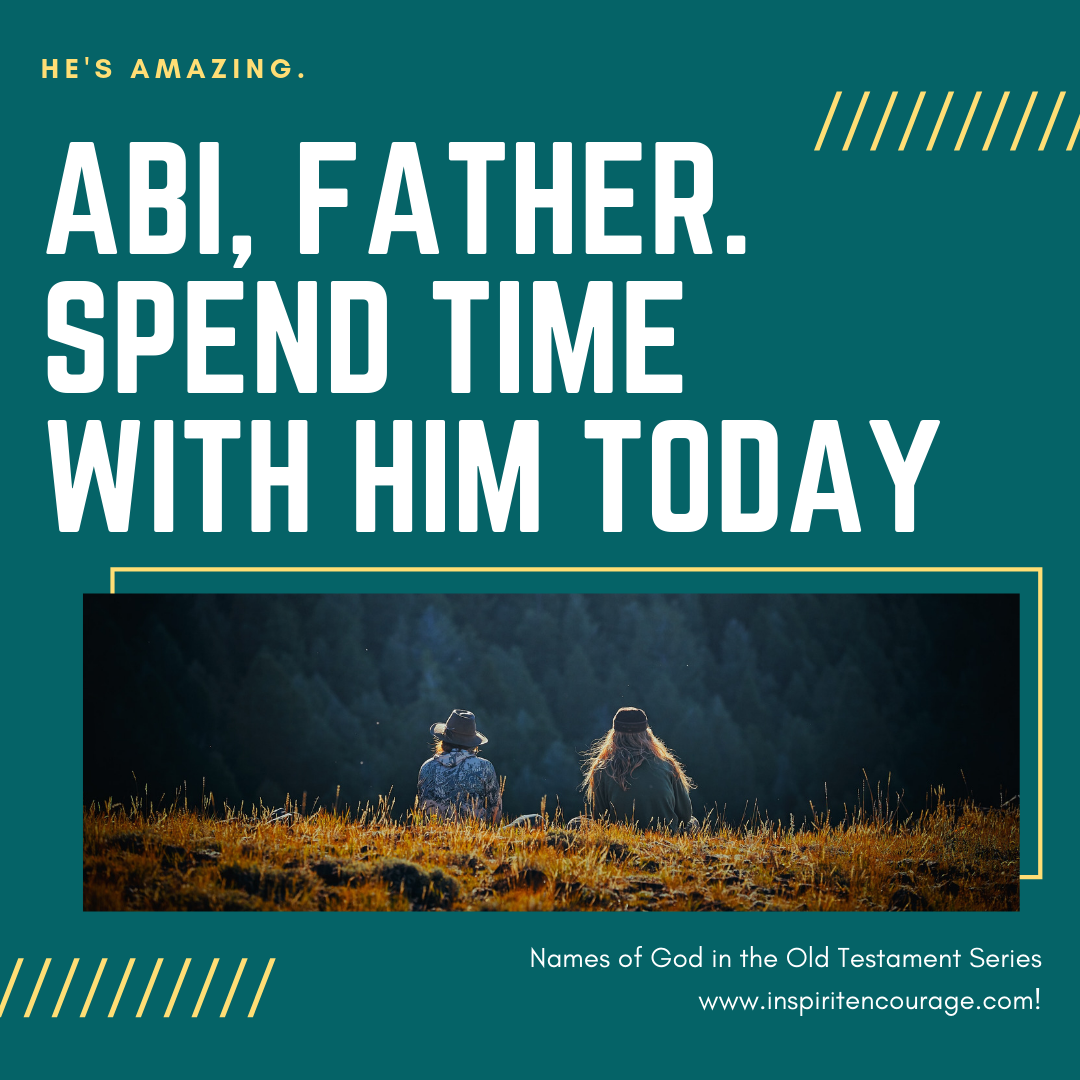Abi, Father - Deuteronomy 32:6
Perhaps we are more familiar with the word Abba that Jesus uses in the New Testament to call on God, the Father. Abba however is a transliteration from the Greek, that we often discuss as meaning Daddy. There an affection and intimacy in that name. We do not use it lightly. Yet, in the Old Testament we find the word Father, Abi and also Abinu (Our Father) and Abiku (Your Father).
I am not convinced that there is significant difference between the use of the two words, Abba and Abi. I believe that God the Father wants to have the intimacy with us, as Christ did with Abba, and this has not changed from the creation of Adam and Eve.
Looking at the definitions of father and dad, you will find numerous sources to outline the differences. A father is the DNA connection in the simple definition. This is most certainly true of us, as well. God created us in his image, male and female (Gen 1:27); that sounds like DNA to me. So, we can confirm the basic qualification of father has been met.
But when we consider the uses of the word Abi in the Old Testament, there is more than the DNA in the definition.
There are a few ideas that come through in the verses which use the name Father. Some may say that I am wordsmithing or ‘reading too much into the words.’ But if we believe that the Word is God-breathed and God-inspired, it only makes sense that each word is where it was intended and has meaning to be mined.
The first verse we should consider is that of Psalm 68:5 (NIV) ‘A father to the fatherless, a defender of widows, is God in his holy dwelling.’ I think this verse speaks loudly to the fact that Abi was more than simply being made in his image. Here God is the father of orphans, those who have no male to protect, lead and nourish them. He shows interest in our wellbeing, which a mere DNA-donor would not do and often signs away his rights to doing.
In Deuteronomy, we have the first case of the use of Abi as God’s name, as part of Moses’s song, delivered just before his death (Deut 32:6 NIV) ‘Is he not your Father, your Creator, who made you and formed you? (footnote translation: Is he not your Father who bought you?)’ It is interesting that the verse is translated in two ways. It implies that the verb is more than just begetting Israel. This song is written after the exodus from Egypt. I must admit, I had not considered the Jews as purchased, but indeed blood was shed for their release and to return them to their original intended position. So, the literal creator (DNA donor) is also the purchaser in this verse. But the descriptors continue from here. In verse seven, the reader is begged to ask those of old for the stories of God, then indeed the actions of Abi are paraphrased. Abi shielded and cared, guarded, carried, led, fed and nourished His people. Here we begin to see the characteristics of the Father as demonstrated through his actions. This is more than mere fatherhood in the song of Moses; it is closer to the Daddy image that we may have.
‘But you are our Father, though Abraham does not know us, or Israel acknowledge us; you, Lord, are our Father, our Redeemer from of old is your name.’ Isaiah 63:16 (NIV) says that God knows us, even though those around us may not. And the addition of our Redeemer states the close relationship with God. The verse talks of the deep intimacy between God and his children. When others do not know us, we turn to those who do, and at times the only on around is God. My husband and I move every few years for his work, and I can affirm that at times following a move, no one is around me. By necessity, my husband is at work, and I am alone during the day. It takes time to meet others, let alone know them. In those times, it is Abi who responds, accompanies me during the day even more than ‘usual’ days.
Lastly, I think it worth looking at the potter. Again in Isaiah, verse 64:8 NIV, we find Abi, ‘Yet you, LORD, are our Father. We are the clay, you are the potter; we are all the work of your hand.’ The verse here couples forming the clay with the father. Shaping clay is generally equated with formation, instruction and teaching. We describe character, knowledge and wisdom as the result of such actions. Again, this is beyond the boundaries of begetting us. Abi also guides us into the person we should be, molds us by instilling character and wisdom. This too falls much more into the ‘daddy’ category rather than mere DNA donor. The action of instructing, teaching, forming requires shared time; time to listen and understand, time to know, time to advise, time together.
In looking at this name of God, Abi, I find that it is much more than merely ‘Father’. Abi, as it is intended to describe a relationship, I think is more accurately translated as Dad or Daddy. The use of the name clearly shows an emotional attachment and investment that simply isn’t there for the austere ‘father’ of today’s vernacular. I am quite content with this development, this evolution of my understanding of the use of father in the Old Testament. Adam and Eve had the intimacy of walking with Abi in the garden at evening. The time spent together with Adam and Eve before their rending the separation is still the desire that Abi has for each of us. Abi desires the relationship of daddy with each of us. I look forward to the image and feelings associated with ‘daddy’ as I read the Old Testament.
